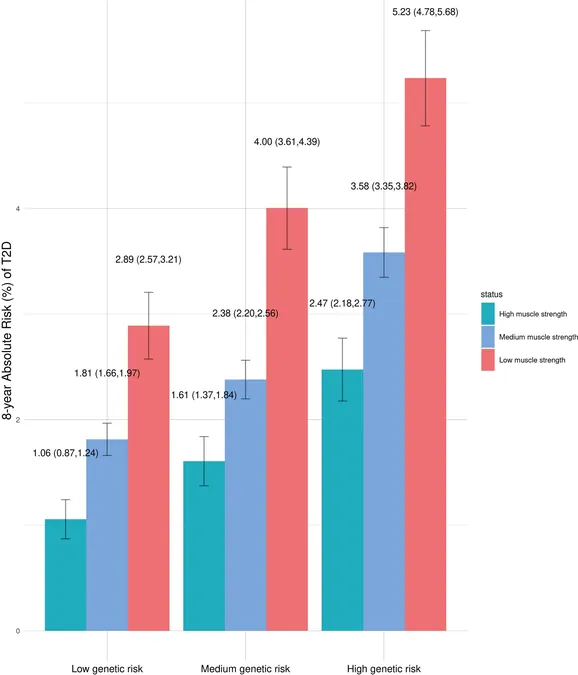
Unlocking the Secret: High Muscle Strength Could Shield You from Type 2 Diabetes Regardless of Genetic Risk!
2025-03-31
Author: Ming
Unlocking the Secret: High Muscle Strength Could Shield You from Type 2 Diabetes Regardless of Genetic Risk!
In a groundbreaking study, scientists from the School of Public Health at the University of Hong Kong (HKUMed) have unveiled a powerful ally in the fight against type 2 diabetes (T2D): high muscle strength. Their comprehensive research examined the relationship between muscle strength and the risk of developing T2D, even among those with a genetic predisposition to the disease.
The findings are striking - individuals with stronger muscles can reduce their risk of T2D by over 40%, irrespective of their genetic makeup. This compelling evidence underscores the significance of muscle strength in diabetes prevention strategies—a fact published in the esteemed journal BMC Medicine.
The Diabetes Crisis: Why Prevention Matters
Type 2 diabetes is not just a personal health challenge; it's a global epidemic. Affecting roughly 10% of the population worldwide, the disease is linked to complications such as heart disease, strokes, high blood pressure, and vascular issues. T2D arises from an intricate dance of genetic factors and lifestyle choices, primarily characterized by elevated blood sugar levels due to insulin resistance.
Despite its prevalence, there’s hope on the horizon. This new research not only elucidates the impact of muscular fitness on metabolic health but also proposes muscle strength as a viable preventive measure, regardless of one’s genetic risk.
Research Insights: What They Discovered
The study harnessed data from an impressive cohort of 141,848 white British individuals, sourced from the UK Biobank, an ongoing project analyzing the health of over 500,000 adults. Muscle strength was measured through grip strength tests, while genetic susceptibility to T2D was assessed based on 138 known genetic variants.
After tracking participants for over seven years, researchers identified nearly 4,743 new cases of T2D. The conclusions are compelling: compared to those with low muscle strength, individuals boasting high muscle strength enjoyed a staggering 44% reduction in their relative risk of developing T2D, even when factoring in genetic predisposition and other risk elements.
A New Angle on Genetic Risk
Crucially, the research indicated an intriguing relationship between muscle strength and genetic susceptibility. Those with high genetic risk paired with high muscle strength appeared to have a lower absolute risk of T2D than individuals with medium or low genetic risk but lacking muscle strength. This pivotal discovery suggests it's not solely about genetics; strength training could be a game-changer for many.
Dr. Wang Mengyao, the study’s lead author, expressed excitement over the implications of these findings: “Our results shed new light on the critical role that maintaining or enhancing muscle strength plays in combating T2D for all middle-aged and older adults, even those with significant genetic risk.”
Looking Ahead: A Call for Further Research
The study’s authors advocate for expanded research, particularly focusing on diverse populations such as East Asians, to explore the universality of these findings. Professor Ryan Au Yeung highlighted the importance of using ethnically specific data to fully understand genetic interactions in relation to T2D risk.
In conclusion, Professor Youngwon Kim underscored the study’s relevance to public health guidelines, recommending that adults engage in muscle-strengthening activities at least twice weekly. As the crisis of type 2 diabetes continues to rise, empowering individuals through muscle strength could be a pivotal strategy for prevention.
Takeaway: Want to lower your T2D risk? Start lifting weights!
Your future health may depend on it!





 Brasil (PT)
Brasil (PT)
 Canada (EN)
Canada (EN)
 Chile (ES)
Chile (ES)
 Česko (CS)
Česko (CS)
 대한민국 (KO)
대한민국 (KO)
 España (ES)
España (ES)
 France (FR)
France (FR)
 Hong Kong (EN)
Hong Kong (EN)
 Italia (IT)
Italia (IT)
 日本 (JA)
日本 (JA)
 Magyarország (HU)
Magyarország (HU)
 Norge (NO)
Norge (NO)
 Polska (PL)
Polska (PL)
 Schweiz (DE)
Schweiz (DE)
 Singapore (EN)
Singapore (EN)
 Sverige (SV)
Sverige (SV)
 Suomi (FI)
Suomi (FI)
 Türkiye (TR)
Türkiye (TR)
 الإمارات العربية المتحدة (AR)
الإمارات العربية المتحدة (AR)